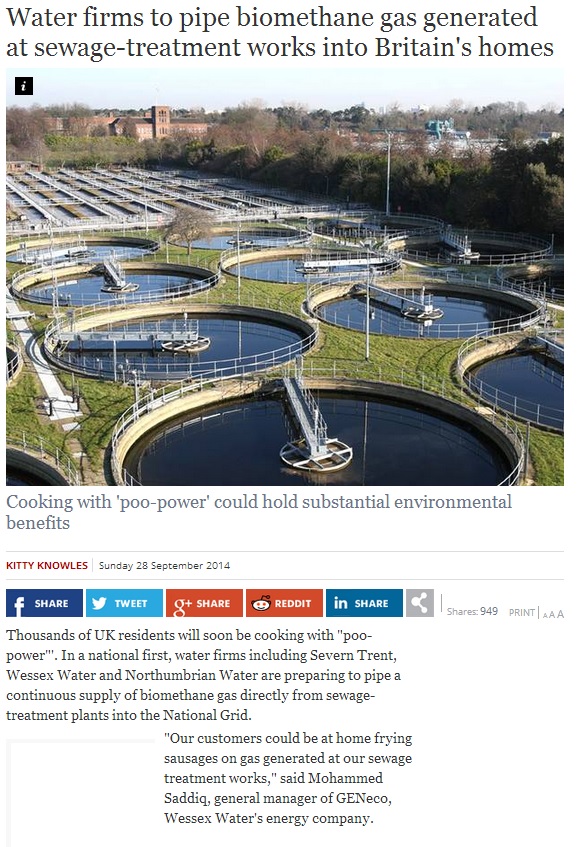October 16, 2014 by Fred Busch
In an effort to reduce the U.K.’s energy costs and greenhouse emissions, several water firms in England are looking to harness another source of renewable energy: ‘poo power’. As stomach-churning as the concept sounds, Wessex Water and Northumbrian Water nonetheless have plans to follow Severn Trent’s lead and use sewage treatment plants to turn wastewater into biomethane. According to The Independent, Severn Trent provides an annual supply of 1,200m3 worth of biomethane to the Grid and is set to eventually power 4,200 homes in the future:
“Although it’s a little unsavoury, there’s lots and lots of power locked in poo, and when processed it’s perfect to generate clean renewable green gas”, said Severn Trent Water’s Simon Farris.”It’s also important for lowering our energy costs… so that we can pass those on to customers.”
Mr Farris predicts, over the next 20 years, Severn Trent’s gas-to-grid scheme could cut its carbon emissions by 300,000 tons – the weight of more than 50,000 adult African elephants. The volume of biomethane produced will also be greater than the firm’s gas needs, allowing it to be classified “self-sustainable”.
This story proves that efforts to meet 15 percent of the U.K.’s overall power needs with methane by 2020 are in full gear. Such a significant undertaking requires every single component in a sewage treatment facility to be of the best quality, particularly the gas pipes and pipe fittings. Fortunately, the gas industry can count on a steel pipe fitting manufacturer like LEO Fittings Ltd to provide them with reliable socket weld fittings and olet fittings in order to harness biomethane from wastewater.
Unsurprisingly, the task that falls upon these components is by no means easy. Before biomethane can be utilised, it must be purified of all contaminants and unwanted chemicals, including halogenated hydrocarbons and alkanes. This process involves high pressures of up to 60 bar, which can ruin pipes and pipe fittings of lesser quality. There is also the threat of corrosion to think about, as is usual when working with volatile chemicals and acids.
Water treatment plants that provide ‘poo power’ require pipe fittings that are up to the task. Every stainless steel sweepolet, which ensures constant fluid or gas flow in a pipe system, must meet British standards for general applications—especially BS EN 10296-2, or the specifications for welded circular steel tubes used for engineering and mechanical purposes.
As there are about 9,000 sewage works in the U.K., the potential for biomethane production in the country is truly promising. For this reason, the need for top-notch pipe fittings is bound to increase.
(Source: Water firms to pipe biomethane gas generated at sewage-treatment works into Britain’s homes, The Independent, September 28, 2014)


Recent Comments